#laravel add to collection
Explore tagged Tumblr posts
Text
Modern Custom Web App Development Services

Today’s digital era requires tailored solutions for companies to remain agile, competitive, and human-centric. Packaged software sometimes does not make a good fit with particular operations requirements or with the user experience. This is where custom web app development comes in.
Intelligent Scalable High Performance Web Apps At Appnox Technologies, we create intelligent, scalable, and high performing web applications that are tailored to help you meet your goals. Whether you’re baby stepping your way into the market or a seasoned enterprise looking to streamline internal processes, our bespoke solutions allow you to break new ground, improve productivity, and enhance the digital experience for you and your users.
What Is Custom Web Application Development?
A custom web application is a unique or custom-built software application that is designed to cater the exclusive needs, processes, and challenges of a certain business or organization.
Goals of a Custom Web Application:
Offer an incredibly customized and efficient digital product
Improve business systems and processes
Encourage innovation in the enterprise
Provide a competitive edge in the marketplace
Top Benefits of Custom Web Application Development
Customized for Your Company
Your custom app is designed based on your unique requirements. If you need to connect to a particular CRM, automate your supply chain, or comply with user-specific workflows, you get exactly the solution you require.
High Scalability
Our products are designed for scalability. Your web app can scale with your user base or feature set without the need to sacrifice performance.
Seamless Integrations
Want to connect to a third-party tool such as a payments gateway, an analytics platform or an API? With a custom solution, you can do pretty much whatever the hell you want to add—and how it works—ability.
Enhanced Security
Tailor-made apps are designed with strong security measures in mind for your unique business structure. You sidestep typical exploits its off-the-shelf counterparts and have a peace of mind that your privacy is upheld.
Our Custom Web Application Development Services
Appnox Technologies is a professional web application development company that provides end-to-end web development services and we do full cycle back end and front end application development. Our services include:
Custom Web App Design & DevelopmentPowerful backend combined with user orientated designs to develop responsive and interactive applications.
Enterprise Web SolutionsScaling enterprise applications to automate and optimize intricate business processes.
SaaS Application DevelopmentDeveloped strong, subscription-based web platforms for both startups and established software businesses.
Progressive Web Apps (PWAs)On-demand, app-like experiences with offline support and performance on the web.
API Development & Integration Building custom APIs or using third-party services to enhance functionality and connectivity.
Ongoing Maintenance & SupportMaintaining your web application to be the fastest, most secure and modern it can be, now and forever.
Appnox’s Custom Web App Development Process
Our apps are built to scale with your business. As your needs grow, we can easily enhance existing features or add new ones to support your expansion.
Requirement Analysis We collect and evaluate business objectives, technological requirements and end user requirements.
UI/UX DesignYour designers develop user friendly, mobile friendly interfaces to improve interaction.
Custom DevelopmentLeveraging modern frameworks such as React, Node. js, Vue. js, and Laravel, and together they’ll help turn your vision into a long-lasting success.
Testing & QAWe test things — performance, security, usability — to ensure you get a mostly bug-free, stable product.
Deployment & ScalingWe deploy to your cloud (Aws/Azure/GCP) of choice with full CI/CD pipelines for easy going live.
Ongoing SupportAfter we launch, we will continue to maintain, monitor, and add features to your app.
Industries We Serve
Our customized web app development solutions are used by:
Healthcare – Patient Portal, Appointment Scheduling System, Health Dashboard
Fintech – Platforms to execute transaction s, tracking and investment and risk analytics tout etc.
eCommerce – Custom shopping carts, product management systems, and vendor marketplaces
Travel & Logistics – Booking engines, routing and Real-time Tracking Solutions
Education – LMS, online exam software and e-learning platforms
Real Estate – Listing apps, Property Management CRM tools, virtual tour integrations etc.
Why Choose Appnox Technologies?
Selecting the best vendor for your custom web application, is one of the key decisions to make. And this is why we’re unique at Appnox Technologies:
✔ Deep Technical Expertise
Our team is proficient in cutting-edge web technologies such as React, Angular, Laravel, Node. js, and more. We develop solid, secure, scalable applications with the best methodologies in mind.
✔ Full-Cycle Development
We do everything from strategy and design to development, deployment, and support. You end up with a one-stop shop service provider you can trust.
✔ Industry-Specific Solutions
We know the challenges of the industry and build apps that solve real problems—faster and more effectively.
✔ Agile & Transparent Process
We keep you informed at every turn. Support You Because with weekly check ins, demos and feedback you’re always in the loop.
Frequently Asked Questions (FAQs)
Q1: How long does it take to develop a custom web application?
The time for development will correlate with what features and integrations and scope of work you may need. A simple custom app might take 2–3 months; complex enterprise solutions can take 4–6 months or more.
Q2: How much does custom web application development cost?
Pricing depends on functionality, tech stack, and integrations. Price We at Appnox provide cheap price models to suit your budget and needs. Contact us for a free estimate.
Q3: Will my custom web application work on mobile devices?
Yes. All of our software is responsive designed, allowing it to function the same on any desktop, tablet or mobile device.
Q4: Can I upgrade or scale the app later?
Absolutely. Our apps are engineered for scale. As your business scales up, we can simply increase or add features to the app.
1 note
·
View note
Text
What Is PHP

What Is PHP, and why is It Still Essential in Web Development
PHP (short for Hypertext Preprocessor) is one of the most widely used scripting languages for building websites and web applications. It’s open-source, free to use, and runs on the server, meaning it processes tasks before content reaches your browser. Whether you're logging in to a website, filling out a form, or browsing dynamic content, chances are PHP is working behind the scenes.
In this post, we’ll break down what PHP is, what it’s used for, and why it continues to be a key part of modern web development.
What Is PHP?
PHP is a server-side scripting language that runs on web servers like Apache or Nginx. It helps developers build dynamic websites, meaning the content can change based on user input or data from a database.
Instead of just showing static pages, PHP allows for things like:
Displaying personalized user dashboards
Submitting and processing forms
Handling logins and registrations
Connecting to databases and fetching content
Key Features of PHP:
Server-Side Execution: Code runs on the server and sends the result to the browser.
Database Friendly: Easily connects with databases like MySQL, PostgreSQL, or SQLite.
Form Handling: Collects and processes data from HTML forms.
Session Management: Tracks users across pages (great for logins and shopping carts).
Platform Independent: Works on Windows, macOS, Linux—pretty much anywhere.
Large Community & Resources: Tons of tutorials, tools, and frameworks like Laravel.
What Is PHP Used For?
PHP is used for building all kinds of websites—from small personal blogs to full-scale eCommerce platforms. Let’s look at the common ways developers use PHP:
1. Dynamic Website Content
PHP helps create websites that change depending on who is visiting or what they’re doing. Think of personalized greetings, product recommendations, or updating shopping cart totals without refreshing the page.
2. Working With Databases
Need to store user data, products, or blog posts? PHP connects smoothly with databases like MySQL to save and fetch information, making it easy to manage large websites.
3. Handling Forms
When users fill out a form—say, to sign up or contact you—PHP processes that data. It checks if everything’s filled out correctly and then stores or emails the info.
4. User Sessions
PHP helps websites remember who you are as you move between pages. This is essential for things like staying logged in or remembering items in your cart.
5. Security and Automation
PHP allows you to add basic security layers, like input validation, data encryption, and access control. It’s also used for sending emails, generating PDF invoices, or even auto-posting to social media.
Is PHP Frontend or Backend?
PHP is strictly a backend language. While it works alongside frontend tools like HTML, CSS, and JavaScript, PHP runs on the server. It handles all the logic behind the scenes—things like checking passwords, fetching data, or updating user info.
Why PHP Still Matters Today
Even with new languages and frameworks entering the scene, PHP remains highly relevant. It powers big names like Facebook (originally built on PHP), WordPress, and Wikipedia. Plus, frameworks like Laravel have modernized PHP, making development faster and cleaner.
In short, PHP is still a reliable, powerful choice—especially for developers building secure, data-driven websites.
Conclusion
PHP might not always be in the spotlight, but it's still the backbone of the web. It’s fast, flexible, and works well with almost anything. If you're planning to build a dynamic website or web application, learning PHP is a solid first step—and it’s not going anywhere anytime soon.
0 notes
Text
4 Boring Startup Ideas Screaming to Be Built (and How to Build Them)
Everyone wants to build the next Airbnb, Uber, or OpenAI — but what if the real opportunity lies in the “boring” ideas?

These aren’t flashy or buzzworthy, but that’s the point. They solve real problems, target underserved niches, and often come with less competition and more stable revenue. In fact, many boring startups are quietly making millions behind the scenes.
Here are 4 boring startup ideas that are practically screaming to be built — and how you can start building them right now.
Modern Bookkeeping for Freelancers The Problem:
Freelancers and solo entrepreneurs are terrible at bookkeeping. Most dread tax season and use outdated spreadsheets or overly complex tools like QuickBooks.
The Boring Solution:
Build a dead-simple, freelancer-friendly bookkeeping tool that helps with:
Categorizing income/expenses Quarterly tax estimates Invoicing Receipt uploads via mobile
Think “Notion-level simplicity meets Stripe integration.”
How to Build It:
Tech Stack: React, Firebase, Plaid for bank integration Go-To-Market: Start with creators (designers, writers, coaches) on Twitter/LinkedIn. Offer a free trial, then upsell monthly plans. Revenue Model: Freemium or tiered SaaS pricing (\$10–\$30/month)
✅ Bonus: Add AI-powered transaction categorization to stand out.
Compliance Tracker for Small Businesses The Problem:
Small businesses constantly miss local or industry-specific compliance tasks — business license renewals, data regulations, safety checks, etc.
The Boring Solution:
A simple dashboard that tracks compliance deadlines, sends reminders, and offers document templates based on industry and location.
How to Build It:
Tech Stack: Laravel or Django backend, PostgreSQL, clean web UI Data: Aggregate public regulatory calendars by state/province Go-To-Market: Partner with local business associations or legal consultants Revenue Model: \$20–\$100/month based on company size
✅ Extra Opportunity: White-label it for accountants or legal advisors.
Automated HOA/Condo Management Software The Problem:
Homeowners' associations (HOAs) and small condo boards are run by volunteers using paper checks, email chains, and Google Docs. It’s messy and inefficient.
The Boring Solution:
A turnkey web platform for:
Collecting dues online Managing maintenance requests Document storage (meeting minutes, rules) Resident messaging
How to Build It:
Tech Stack: Bubble or no-code MVP → migrate to React/Node Sales Strategy: Cold outreach to HOA boards and property managers Revenue Model: \$50–\$300/month per community
✅ Note: Once you're in, churn is low — they hate switching tools.
Digital Notice Board for Apartment Buildings The Problem:
Most apartment buildings still rely on physical notice boards for updates, lost keys, and maintenance alerts. Tenants ignore them. Management gets flooded with emails.
The Boring Solution:
Create a digital screen + companion app for building announcements, package alerts, lost & found, local deals, etc.
How to Build It:
Hardware: Use affordable tablets or smart displays Software: Web-based backend for management, mobile app for tenants Sales Strategy: Start with co-living spaces or new developers Revenue Model: Hardware + monthly SaaS fee Bonus Revenue: Sell ad space for local businesses
✅ Scalability Angle: Bundle it into smart building management platforms.
Final Thoughts
"Boring" doesn't mean bad — it means unsexy but necessary. These are the types of businesses that solve unglamorous but persistent problems. And that’s where the gold is.
If you’re a builder tired of chasing the next hype cycle, consider starting with a boring startup. It might just be the most exciting decision you make.
0 notes
Text
E-commerce Website Services in Lucknow – Boost Your Online Business with Expert Solutions
In the digital age, having a powerful e-commerce website is essential for any business looking to sell products or services online. Whether you’re a startup, a retail store, or a growing brand, a professionally developed e-commerce platform can help you reach more customers, increase sales, and build a strong online presence. If you’re looking for the ecommerce website services in Lucknow, you’re in the right place.
Why Choose Professional E-commerce Website Development in Lucknow? -
Lucknow is quickly becoming a hub for IT and digital services, and businesses are realizing the power of online selling. A professionally designed e-commerce website not only helps showcase your products attractively but also ensures smooth navigation, secure transactions, and a seamless shopping experience for your customers.

Top Features of Quality E-commerce Website Services in Lucknow
✅ Customized Design -
Stand out from the competition with a custom-designed online store that reflects your brand identity. From color schemes to layout and UI/UX, every aspect is tailored to meet your business goals.
✅ Mobile Responsiveness -
A mobile-friendly website is no longer optional. E-commerce developers in Lucknow ensure your site is fully responsive, offering an excellent experience across all devices.
✅ Secure Payment Integration -
Enjoy secure and hassle-free payment gateway integration with support for popular platforms like Razorpay, Paytm, UPI, credit/debit cards, and net banking.
✅ Product Management -
Easily add, update, and manage products with a user-friendly admin panel. You can also categorize products, manage inventory, and set up discounts or promotions.
✅ Order & Shipping Management -
Track orders, manage shipping, and provide real-time updates to customers. E-commerce websites in Lucknow come with built-in logistics integration to streamline operations.
✅ SEO & Digital Marketing Ready -
Optimized for search engines, your e-commerce site is built with SEO best practices, making it easier to rank and attract traffic. Many service providers also offer digital marketing support to help grow your store.
✅ Customer Management -
Collect customer data, manage accounts, and offer personalized shopping experiences. Features like wishlists, abandoned cart recovery, and email marketing integration improve retention.
✅ Reports & Analytics -
Track sales, user behavior, and performance with detailed reports and dashboards. This data helps in making informed business decisions.
Why Businesses in Lucknow Prefer Local E-commerce Services -
🔹 Cost-Effective Solutions Get high-quality development at competitive prices tailored to local business needs.
🔹 Quick Support & Maintenance Being locally based ensures faster communication, quick updates, and on-demand support.
🔹 Understanding of Local Market Developers in Lucknow understand regional shopping trends and consumer behavior, enabling better customization of features.
🔹 Flexible Technologies Choose from platforms like WooCommerce, Shopify, Magento, Laravel, or custom PHP based on your budget and scale.
Who Can Benefit from E-commerce Website Development? -
Clothing & Fashion Brands
Grocery Stores & Supermarkets
Electronics & Gadget Shops
Handicrafts & Home Decor Stores
Educational & Digital Product Sellers
Restaurants & Food Delivery Services
Conclusion -
If you're planning to take your business online or upgrade your existing e-commerce platform, investing in expert e-commerce website services in Lucknow is the key. With the right team, your online store can become a powerful revenue-generating platform tailored to your goals.
📞 Get in touch with top developers in Lucknow today and bring your e-commerce vision to life with a modern, secure, and high-performing website!
Contact Information -
Email — [email protected]
Phone — 9956973891
Address — 617, NEW -B, Vijay Khand, Ujariyaon, Vijay Khand 2, Gomti Nagar, Lucknow, Uttar Pradesh 226010
#ecommercewebsiteinlucknow#ecommercewebdesigningcompanyinlucknow#topecommercewebdesigninlucknow#ecommercewebsitedesign&developmentinlucknow
0 notes
Text
Javier Cuenca Basketball - How to Start Multivendor Ecommerce Platform
Starting a multivendor e-commerce platform can be a profitable and rewarding business venture. Here’s a step-by-step guide shared by Javier Cuenca Basketball to help you get started:
1. Define Your Niche
Focus: Choose a specific industry or target audience for your platform (e.g., fashion, electronics, handmade goods, etc.).
Research: Analyze the market demand, competition, and potential gaps you can fill.
2. Business Planning
Business Model: Decide how your platform will generate revenue (e.g., commission from vendors, subscription fees, listing fees, or advertisements).
Legal Structure: Register your business and ensure compliance with local laws and regulations.
Budget: Plan the initial investment for development, marketing, and operations.
3. Platform Features
Include essential features such as:
Vendor Management:
Vendor registration and profile creation.
Product listing and inventory management.
Buyer Features:
User-friendly browsing and search.
Secure payment options and multi-currency support.
Admin Panel:
Dashboard to manage vendors, products, orders, and earnings.
Analytics and reporting tools.
Logistics & Returns:
Integration with shipping providers.
Easy return/refund mechanisms.
4. Choose a Technology Stack
Ready-made Solutions:
Platforms like Magento, Shopify (with multivendor plugins), or WordPress with WooCommerce.
Custom Development:
Use programming frameworks like Laravel, Django, or Ruby on Rails to build a tailored solution.
SaaS Solutions:
Services like Sharetribe specialize in multivendor platforms.
5. Development
Hire Professionals: Work with experienced developers or agencies.
UI/UX Design: Focus on creating a user-friendly interface for both vendors and customers.
Testing: Ensure your platform is bug-free and works seamlessly across devices.
6. Secure Your Platform
Implement SSL encryption for secure data transmission.
Use a trusted payment gateway to handle transactions.
Regularly update software and plugins to patch vulnerabilities.
7. Attract Vendors
Onboarding: Offer easy registration and onboarding processes.
Incentives: Provide initial perks like reduced commission rates or free listings.
Support: Offer training and resources to help vendors succeed.
8. Market Your Platform
SEO & Content Marketing: Optimize your website for search engines and create valuable content.
Social Media: Build an active presence on platforms where your target audience spends time.
Paid Ads: Run targeted ads to attract vendors and buyers.
Affiliate Marketing: Collaborate with influencers and bloggers to promote your platform.
9. Launch and Scale
Soft Launch: Start with a small group of vendors and customers to test your platform.
Feedback: Collect feedback to improve your platform before a full-scale launch.
Growth Strategies:
Expand your vendor base.
Add new categories or features based on demand.
10. Monitor and Improve
Use analytics to track performance metrics like traffic, sales, and customer satisfaction.
Continuously improve your platform’s features and usability.
Stay updated with industry trends and adapt to changing customer needs.
Would you like to dive deeper into any specific step?
Follow Javier Cuenca Basketball for more such posts!
0 notes
Text
Exploring Programming Languages: A Guide to Training at DICS Innovatives
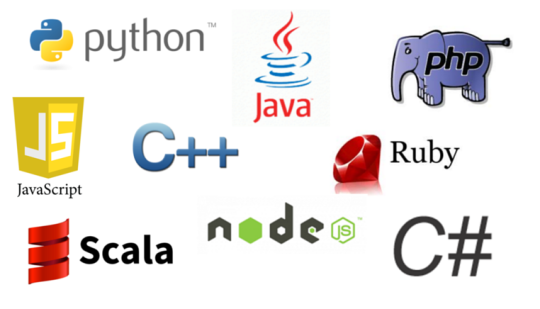
In today’s technology-driven world, proficiency in programming languages is a vital skill. Whether you're a beginner looking to dive into coding or an experienced developer aiming to enhance your skills, training programs can provide the structured learning you need. At DICS Innovatives, we offer comprehensive training in several key programming languages, including Python, Java, C, and C++. Here’s a closer look at what each training program entails.
Python Training: The Versatile Language
Want to learn python course join best python training institute in Pitampura, Python has gained immense popularity due to its simplicity and versatility. It’s widely used in web development, data analysis, artificial intelligence, and more.
What You’ll Learn:
· Basic syntax and programming concepts
· Object-oriented programming
· Libraries and frameworks (like Flask and Django)
· Data manipulation and analysis with Pandas
Why Choose Python?
Python is an excellent choice for beginners, thanks to its readable syntax. It also has a vast community and numerous resources for learners.
Java Training: The Foundation of Enterprise Applications
Want to learn python course join best java training institute in Pitampura, Java is a cornerstone of enterprise-level applications and Android development. It’s known for its portability and robustness.
What You’ll Learn:
· Core Java concepts (OOP, exception handling, etc.)
· Java collections framework
· Building GUI applications
· Introduction to Java frameworks (Spring, Hibernate)
Why Choose Java?
Java’s strong community support and extensive libraries make it a great choice for those looking to enter the tech industry, especially in large organizations.
PHP Training: The Language of the Web
Want to learn python course join best php training institute in Pitampura, PHP is a server-side scripting language that is essential for web development. It powers many websites and applications, making it a key skill for web developers.
What You’ll Learn:
· Basic and advanced PHP syntax
· Working with databases (MySQL)
· Building dynamic web applications
· Frameworks like Laravel and CodeIgniter
Why Choose PHP?
PHP is widely used for web development due to its ease of integration with HTML and its capabilities for server-side scripting. It’s a great choice for those looking to specialize in web technologies.
C Training: Understanding the Basics
C is a powerful language that serves as the building block for many other languages. It’s crucial for systems programming and embedded systems.
What You’ll Learn:
· Fundamental programming concepts
· Memory management and pointers
· File handling
· Basic algorithms and data structures
Why Choose C?
Learning C provides a deep understanding of how software interacts with hardware, making it essential for aspiring systems programmers.
C++ Training: The Next Step from C
C++ builds on C and adds object-oriented features, making it suitable for large-scale applications, game development, and performance-critical software.
What You’ll Learn:
· Advanced C++ concepts (inheritance, polymorphism, etc.)
· Standard Template Library (STL)
· Developing applications using C++
· Best practices in software design
Why Choose C++?
C++ offers greater control over system resources and is widely used in competitive programming and game development.
Why DICS Innovatives?
At DICS Innovatives, we pride ourselves on providing high-quality training that combines theoretical knowledge with practical experience. Our courses are designed by industry experts and include hands-on projects to ensure you gain real-world skills.
· Benefits of Training with Us:
· Experienced instructors
· Flexible learning schedules
· Comprehensive course materials
· Placement assistance
Conclusion
Whether you choose Python, Java, C, or C++, DICS Innovatives is here to guide you on your programming journey. Our tailored training programs will equip you with the skills you need to thrive in the tech industry. Join us today and take the first step towards a rewarding career in programming!
Link Source: https://dicsinnovatives.blogspot.com/2024/10/exploring-programming-languages-guide.html
0 notes
Text
👨💻 Programming Languages: A World of Diversity 🌐
In the vast realm of programming, languages are the tools that empower developers to create, innovate, and solve problems. Each programming language brings its unique syntax, features, and paradigms to the table, catering to different needs and preferences. Let's embark on a journey through this diverse landscape!
1. Python 🐍: Known for its simplicity and readability, Python has soared in popularity among beginners and seasoned developers alike. Its versatility allows it to excel in web development, data science, machine learning, and more. With a rich ecosystem of libraries and frameworks like Django and Flask, Python continues to be a go-to choice for many projects.
2. JavaScript 💻: As the language of the web, JavaScript powers the interactive elements of websites and web applications. With the rise of frameworks like React, Angular, and Vue.js, JavaScript has evolved beyond the browser, enabling developers to build robust front-end and even full-stack applications. Its asynchronous nature and event-driven architecture make it indispensable for modern web development.
3. Java ☕: Renowned for its portability and scalability, Java remains a stalwart in enterprise software development. With the advent of Android, Java has also become the primary language for mobile app development on the platform. Its strong typing and extensive standard library contribute to its reliability and performance in large-scale projects.
4. C/C++ 🖥️: The backbone of system programming and high-performance computing, C and C++ offer unparalleled control over hardware and memory. From operating systems to game engines, these languages power critical software where efficiency is paramount. While they may have steeper learning curves compared to higher-level languages, their performance benefits justify the investment for many projects.
5. Swift 🍎: Apple's Swift has revolutionized iOS and macOS development with its modern syntax and safety features. Designed to be fast, expressive, and easy to learn, Swift has gained traction among developers building apps for Apple's ecosystem. With SwiftUI simplifying UI development and Swift becoming open-source, its popularity is on the rise beyond Apple platforms.
6. Go (Golang) 🚀: Developed by Google, Go combines simplicity with performance, making it ideal for building scalable and concurrent systems. With its built-in support for concurrency through goroutines and channels, Go excels in handling parallel tasks efficiently. Its static typing and minimalist syntax contribute to rapid development without sacrificing runtime efficiency.
7. Ruby on Rails 💎: Ruby on Rails, or Rails, embodies the principles of convention over configuration and don't repeat yourself (DRY), streamlining web development and emphasizing developer productivity. With its elegant syntax and vast collection of gems, Rails enables rapid prototyping and the creation of robust web applications with minimal boilerplate code.
8. TypeScript 📝: A superset of JavaScript, TypeScript adds static typing and other advanced features to the language, enhancing code maintainability and scalability. With its strong tooling support and compatibility with existing JavaScript codebases, TypeScript has gained popularity in large-scale projects where type safety is crucial.
9. Rust 🦀: Renowned for its emphasis on safety, performance, and concurrency, Rust offers a modern solution to system programming challenges. Its ownership model and borrow checker enforce memory safety without sacrificing runtime speed, making it suitable for building reliable and secure software, especially in domains like embedded systems and networking.
10. PHP 🐘: Despite its critics, PHP remains a cornerstone of web development, powering a significant portion of the internet's dynamic content. With frameworks like Laravel and Symfony, PHP enables developers to build robust and scalable web applications quickly. While it has faced scrutiny for its inconsistencies, PHP continues to evolve, addressing performance and language design concerns.

0 notes
Text
web development,
web development,
In today's digital age, the online presence of businesses and individuals alike plays a pivotal role in success. At the heart of this digital realm lies web development, a dynamic field that continues to evolve and shape the way we interact with the internet. Whether you're a seasoned developer or a novice exploring the possibilities, understanding the fundamentals of web development is essential. In this comprehensive guide, we'll delve into the intricacies of web development, exploring its various aspects, technologies, and best practices.
Understanding Web Development:
At its core, web development refers to the process of building, creating, and maintaining websites. This multifaceted discipline encompasses both front-end and back-end development, each playing a crucial role in delivering seamless user experiences.
Front-End Development:
Front-end development, also known as client-side development, focuses on the visual elements and user interface of a website. Front-end developers utilize languages such as HTML (Hypertext Markup Language), CSS (Cascading Style Sheets), and JavaScript to bring web designs to life. HTML provides the structure of web pages, CSS enhances their appearance and layout, while JavaScript adds interactivity and functionality.
Back-End Development:
In contrast, back-end development, or server-side development, deals with the behind-the-scenes functionality of websites. Back-end developers work with server-side languages like Python, Ruby, PHP, and databases such as MySQL, MongoDB, and PostgreSQL to manage data, handle user authentication, and perform server-side processing. Frameworks like Django, Ruby on Rails, and Laravel streamline back-end development by providing pre-built components and tools.
Full-Stack Development:
Full-stack development bridges the gap between front-end and back-end development, allowing developers to work on both aspects of web development. Full-stack developers possess a comprehensive understanding of both client-side and server-side technologies, enabling them to create end-to-end solutions for web applications.
Key Technologies and Tools:
The landscape of web development is constantly evolving, with new technologies and tools emerging at a rapid pace. Some of the key technologies and tools shaping the field include:
Responsive Web Design: With the proliferation of mobile devices, responsive web design has become essential for ensuring optimal user experiences across various screen sizes and devices.
CSS Frameworks: Frameworks like Bootstrap, Foundation, and Bulma provide pre-built CSS components and layouts, making it easier to create responsive and visually appealing websites.
JavaScript Libraries and Frameworks: JavaScript libraries such as jQuery and frameworks like React.js, Angular, and Vue.js empower developers to build dynamic and interactive web applications.
Content Management Systems (CMS): CMS platforms like WordPress, Joomla, and Drupal simplify the process of creating and managing website content, making them ideal for non-technical users and businesses.
Version Control Systems: Tools like Git and platforms like GitHub facilitate collaboration among developers, allowing them to track changes, manage code repositories, and work on projects collectively.
Best Practices in Web Development:
In addition to mastering various technologies and tools, adhering to best practices is essential for ensuring the quality, performance, and security of web applications. Some of the best practices in web development include:
Writing Clean and Maintainable Code: Following coding standards, using meaningful variable names, and organizing code into modular components enhance readability and maintainability.
Optimizing Performance: Minifying CSS and JavaScript files, optimizing images, and employing techniques like lazy loading improve website performance and loading times.
Ensuring Accessibility: Designing websites with accessibility in mind, including proper HTML semantics, providing alternative text for images, and ensuring keyboard navigation, ensures that all users, including those with disabilities, can access and navigate the site effectively.
Securing Web Applications: Implementing security best practices such as input validation, user authentication, and encryption of sensitive data helps protect web applications from common security threats like SQL injection, cross-site scripting (XSS), and cross-site request forgery (CSRF).
Conclusion:
Web development is a dynamic and ever-evolving field that offers endless opportunities for innovation and creativity. Whether you're a front-end enthusiast, a back-end aficionado, or a full-stack wizard, mastering the art of web development requires continuous learning, experimentation, and adaptation to stay abreast of the latest trends and technologies. By understanding the fundamentals, embracing best practices, and leveraging the right tools, developers can create immersive and impactful web experiences that resonate with users across the globe.
0 notes
Text
How to solve loaders & jquery is not working in the livewire pagination
Enhancing Livewire Pagination with Loaders and jQuery Integration
Livewire stands as a robust framework tailored for crafting dynamic interfaces within Laravel applications. One common challenge developers face is integrating loaders and jQuery functionality seamlessly into Livewire pagination. In this tutorial, we’ll explore how to achieve this integration to enhance user experience while navigating through paginated content.
First, ensure you have Livewire installed in your Laravel project. If Livewire is not yet installed in your Laravel project, you can easily add it using Composer:
Next, set up Livewire pagination in your Livewire component. Suppose we have a simple Livewire component named Posts. Within this component, we’ll paginate a collection of “posts” Get Started fetched from the database.
#coding#developer#responsivedesign#laravel#php script#phptraining#php programming#webdevelopment#php web development services#reactjs#php#javascript#programming#codeblr#jquery#html5 css3#webdesign#livewire#libraries
0 notes
Text
5 Unit Testing Tools You Must Know in 2024

Introduction:
Unit testing is one of the most important areas to ensure code coverage and basic testing for the applications or software in today’s world. With so many different unit testing tools available, Choosing the right tool can be challenging.
Don't Worry, In this Article we'll explore 5 Unit Testing Tool you must know in 2024!
So without delaying further let's start!
What is Unit Testing?
Before we begin, Let's understand what is Unit Testing!
Unit testing is a type of software testing where we test every single units or components of a software system. It's a very fundamental testing technique where we can found the bugs very easily with this method of testing.
Unit testing involves testing the smallest components in an application, such as functions or methods, to ensure they meet their design and intended behavior.
Benefits:
Unit testing has many benefits some of them are mentioned below:
Early Bug Detection: By testing small unit/function we can find the bug in very early stage.
Improved Software Design: It helps to write modular & decoupled code that is easier to understand, maintain, and test.
Facilitates Refactoring and Code Maintenance: Unit tests provide a safety net for refactoring code. When developers refactor the code, the tests can quickly identify if any bugs have been introduced.
Automation and Continuous Testing: Unit tests can be automated and integrated into the development process.
5 Unit Testing Tools:
1. JMockit:
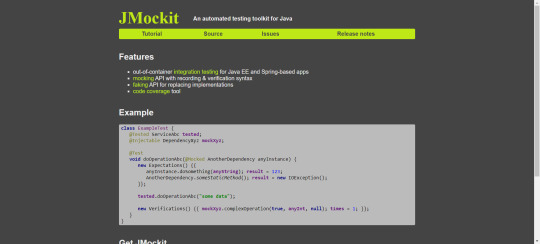
JMockit is an open-source tool for Unit Testing with the collection of tools and API.It is designed to be used with testing frameworks like JUnit or TestNG.
JMockit allows users to mock various elements such as public and private methods, field values, static methods, static blocks, and constructor.
2. SimpleTest:
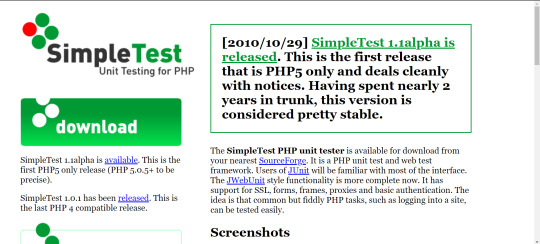
It is an open-source unit testing framework dedicated to PHP Programming Language.
It is used for testing PHP applications, including Drupal projects. It provides features such as xUnit style test cases, mock objects, and a built-in web browser for testing web sites directly.
3. PHPUnit:
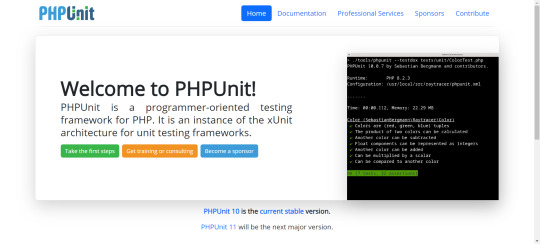
PHPUnit is a unit testing framework for PHP developers. Its building block is derived from the xUnit design for the unit testing system. We can use PHPUnit in the Command line as well which makes it more preferred by the QA testers.
PHPUnit is integrated with virtually all of the main PHP development such as Laravel, Symfony, Zend, Yii, CakePHP, and so on.
4. NUnit:
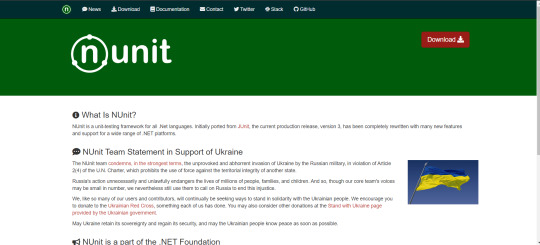
NUnit is an open-source unit testing tool for the .NET platform and languages. It is also part of the .NET Foundation. NUnit is a convenient framework for writing tests, along with its accompanying documentation.
It allows developers and QA testers to add relevant metadata attributes to improve a unit test's context.
5. Mockito:
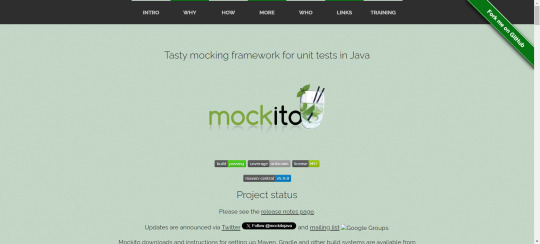
Mockito is an open-source mocking framework with a simple and clean API that enables you to write readable, verifiable tests. Mockito makes it easier for both developers as well as tester to create Mock Data.
Mockito integrates with Cucumber, Spring, and Jenkins, along with built-in support for managing a mocking life cycle with JUnit.
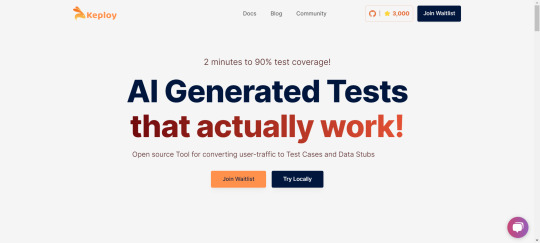
Conclusion
If you found this blog post helpful, please consider sharing it with others who might benefit. You can also follow me for more content on Javascript, React, and other web Development topics.
0 notes
Text
Why Learning PHP Is Still a Smart Career Move in 2025: Online and Offline Training Options
In the ever-evolving world of web development, programming languages come and go. Trends shift, new frameworks arise, and technologies become obsolete. Yet, PHP—a language that’s been around for over two decades—continues to be a cornerstone of web development. With over 75% of websites running on PHP in some form, its relevance remains strong even in 2025.
Whether you’re an aspiring web developer, a software enthusiast, or a professional looking to expand your tech toolkit, learning PHP can still be a career-defining move. And thanks to flexible learning options like online courses and local training centers, getting started with PHP is easier than ever.
This blog explores why PHP remains a viable choice, who should learn it, what skills you’ll gain, and the best places to start your journey—including PHP Online Course options and dedicated PHP Training in Chandigarh.
Why PHP Still Matters in 2025
Despite facing competition from newer technologies like Node.js, Python, and Ruby on Rails, PHP maintains a stronghold in the industry. Here's why:
Widespread Adoption: Platforms like WordPress, Joomla, and Drupal are still built on PHP. WordPress alone powers around 43% of all websites.
Vast Ecosystem: PHP boasts an enormous ecosystem of libraries, frameworks (such as Laravel, Symfony, and CodeIgniter), and CMSs.
Low Barrier to Entry: PHP is beginner-friendly, making it an ideal first programming language.
Continuous Development: PHP 8 and beyond have added modern features, making it faster and more secure.
Great for Freelancing: Many small and medium-sized businesses rely on PHP, creating a constant demand for PHP freelancers.
Who Should Learn PHP?
PHP is suitable for a variety of learners and professionals:
Students and Beginners: PHP is a gateway to understanding server-side programming and web development.
Freelancers: If you're looking to offer web development services, PHP knowledge is invaluable.
Working Professionals: Already in the tech field? Adding PHP to your skill set can increase your value in the job market.
Startup Founders: Want to build your MVP (Minimum Viable Product) quickly? PHP can be a fast and cost-effective choice.
Core Concepts Covered in PHP Training
Whether you're learning PHP online or attending a local institute, a well-structured training program will typically cover the following topics:
PHP Basics: Syntax, variables, operators, and control structures.
Form Handling: How to collect and process data from HTML forms.
File Handling: Reading and writing files using PHP.
Working with Databases: Integrating with MySQL or PostgreSQL.
Sessions and Cookies: Essential for user management and stateful applications.
Object-Oriented Programming: Classes, inheritance, and encapsulation in PHP.
Error Handling: Debugging and managing exceptions.
Security Practices: Preventing SQL injection, cross-site scripting, and other vulnerabilities.
Frameworks: Introduction to Laravel, CodeIgniter, or Symfony.
Advantages of Taking a PHP Online Course
Learning PHP online offers unmatched flexibility and accessibility. Here are some benefits:
Self-Paced Learning: Learn on your own schedule, at your own pace.
Wide Variety: Choose from video lectures, tutorials, and interactive coding platforms.
Cost-Effective: Many online courses are more affordable than classroom training.
Global Access: Learn from top instructors around the world.
Certification: Many platforms offer certificates that add value to your resume.
Some platforms even offer community support, quizzes, and project-based learning to help solidify your knowledge.
If you're looking for a reliable PHP Online Course, make sure it includes both theory and practical projects. This will ensure that you not only understand the concepts but can apply them in real-world scenarios.
The Importance of Localized Learning: PHP Training in Chandigarh
While online learning is incredibly useful, some learners benefit more from in-person or hybrid learning. For such individuals, classroom-based programs offer several advantages:
Hands-on Mentorship: Face-to-face interaction with trainers can enhance learning.
Structured Environment: Scheduled classes keep you accountable and motivated.
Peer Learning: Interacting with fellow students can lead to idea exchange and networking.
Career Guidance: Many institutes offer resume workshops, mock interviews, and job placement assistance.
If you’re based in northern India and looking for a practical, job-oriented course, consider enrolling in PHP Training in Chandigarh. Chandigarh is rapidly emerging as an IT education hub, and reputed institutes offer tailored PHP courses aligned with industry requirements.
Career Opportunities After Learning PHP
Completing a PHP course opens doors to several job roles:
Web Developer
Backend Developer
Full-Stack Developer
WordPress Developer
PHP Freelancer
Software Engineer
You can work with startups, agencies, or MNCs—or even start your own web development venture.
Some companies still maintain legacy PHP systems, offering lucrative opportunities for maintenance and upgrades. With experience, you can also pivot into software architecture or team leadership roles.
PHP vs. Other Backend Languages
Let’s take a quick look at how PHP compares to other popular backend languages:
Feature
PHP
Python
Node.js
Ruby
Ease of Learning
Easy
Very Easy
Moderate
Moderate
Speed
Fast
Moderate
Very Fast
Moderate
Community Support
Large
Huge
Large
Small
Frameworks
Many
Many
Many
Few
Hosting Support
Excellent
Good
Good
Limited
As the table shows, PHP holds its own against newer competitors. It continues to be a viable and practical choice for backend development.
How to Choose the Right PHP Course
When selecting a PHP course—online or offline—consider the following:
Curriculum: Ensure the course covers the latest PHP version and frameworks.
Project Work: Look for courses that include real-world projects.
Trainer Experience: Learn from professionals who have real development experience.
Student Reviews: Feedback from previous students can offer valuable insights.
Job Support: Institutes that help with job placements can provide added value.
Final Thoughts
PHP may not be the flashiest language on the market, but its practicality, widespread use, and ease of learning make it a smart choice in 2025. Whether you're a student just starting out or a professional aiming to diversify your skill set, learning PHP can open up a world of opportunities.
With flexible PHP Online Course options and top-rated PHP Training in Chandigarh programs available, there’s no better time to invest in your future. The web is evolving, and so should you.
Start learning PHP today—and become a part of the digital transformation that’s shaping our world.
0 notes
Text
Benefits of Laravel Development Services for New Businesses

Taylor Otwell invented Laravel, one of the most popular open-source frameworks for website development, which uses a model–view–controller (MVC) structure based on Symfony, a collection of reusable PHP components. This PHP framework’s source code is available on GitHub under the terms of the MIT License.
For building an amazing CMS or Web application, Laravel is responsive, light, clear, and easy to use. It comes with a number of tools and modules that help developers build everything from simple to big web applications faster. As a result, there is no need to rebuild functions in each software project. Data-related software solutions, content-oriented websites such as news and blogs, enterprise software such as CRM and CMS, e-commerce-based software, and social networking websites are examples of specific categories. This framework offers a set of classes that make the life of PHP developers considerably simpler. As a result, Laravel is more beneficial when a developer wants to hide parts of the sophisticated HTTP or adds crucial functionality.
Because of its simplicity, clarity, and utility, Laravel Web Development is in great demand. The developer community prefers Laravel because it allows for more coding experience and faster creation of non-redundant code in apps. Laravel web development is utilized by enterprises, industries, and businesses that are constantly evolving and in high demand throughout the world, allowing their community to thrive for many years. Because Laravel’s MVC isolates models from views, the amount of dependencies between them is reduced, and modifications to one layer have a little influence on the others. MVC code is more structured, less brittle, and simpler to debug as a consequence.
One of the main advantages of Laravel is that the code base is extremely secure, with few to no dangers and robust protection. Laravel also uses a blade templating engine, which allows you to create unique and attractive layouts. Blade views are assembled and cached until they are further updated, reducing loading time and improving search engine results. Furthermore, Laravel generates an authentication configuration file with numerous options out of the box, allowing you to create a fully effective authentication scheme with a single command. You may simply add capabilities to apps without having to write them from start using Laravel’s modular packaging system, develop your own code packages, or install ready-to-use packages for routine usage.
Laravel development services often employ software specialists that specialize in the Laravel framework. They enable the creation of high-functioning web apps that improve the user experience. A Laravel developer is in charge of creating and maintaining contemporary online applications using standard web development tools, producing clean and secure modular code that has been rigorously tested and evaluated, and validating the validity and consistency of HTML, CSS, and JavaScript across platforms. They are also responsible for diagnosing and resolving technical difficulties, managing and creating databases, and running back-end and User Interface (UI) testing to improve an application’s operation. These developers also coordinate with other developers (front-end, back-end, mobile app, etc.) and project managers to expedite software development and document task progress, architecture, and development process, all while staying current with the latest technology trends and best practices in Laravel.
The expanding needs of the web industry are difficult to match, especially if your web development staff lacks essential skills. Maintaining a sense of balance in this profession necessitates keeping up with the ever-changing online trends. The rising IT industry standards have prompted us to consider a ready-to-use solution to fulfill market requirements. The most crucial element to utilize for this aim is an effective framework.
You can undoubtedly deal with the shifting wants of the industry if you use an innovative framework. This is where skilled Laravel web development services come in, that do extensive study and develop new ideas in order to keep up with the latest technical developments throughout the world. Thus, hiring a professional Laravel application development company to finish your website development tasks with accuracy and progress has numerous advantages.
IBR Infotech is one of the top Web Development Companies, providing a comprehensive range of Laravel application development services at reasonable costs to its customers. They have a skilled team of developers that are well-versed in the Laravel Platform and can provide you with high-quality solutions at a fair cost if you want to hire Lavarel developers. They have a long history of offering business development services and are capable of delivering web app development and mobile solutions using agile development approaches.
0 notes
Photo

chunk | Laravel Collections In this episode we are tackling, the method chunk(). For the best experience, follow along in our interactive school at About This ... source
#“laravel collection generate new transformed array”#“laravel collection move item”#“laravel collection remove keys”#“laravel collections chunk”#Laravel#laravel 6#laravel 6 collections#laravel add to collection#laravel advanced#laravel array#laravel collection#laravel collection filter example#laravel collection methods#laravel collection modify item#laravel collection modify value#laravel merge two collections
0 notes
Text
Development Update - March 2023

Hi there folks, Miyazaki here with Mythaura’s development update for the month of March!
Topics covered include:
New Special: Panda
Beast Creator Contest Winners
Ko-fi Q4 2023 Concepts
Ko-fi Sponsored Items
More info available under the cut!

New Special: Panda

We’ve added our newest Special marking to the Beast Creator demo: Panda!
Panda has coverage on a beast’s limbs and eyes. This Special has a lot of fun layering opportunities with other Specials–be sure to play around with it to see for yourself all the potential it can bring!

Beast Creator Contest Winners

Thank you for all the great submissions to the Beast Design Contest! You all never cease to impress us with your creativity. For the March 2023 Beast Creator Contest we’ve got our three winners: iddq_tea, Zelie, and LMNas!
Our three winners will each have the rewards automatically applied to their accounts, and these three beasts will be featured on the homepage for Quarter 4 (April through June).
Keep an eye out for our next Beast Creator Contest–we’ll be gathering entries in June to display on our site for Quarter 1 (July through September).

Ko-fi Quarter 4 (2023) Concepts


It’s the first day of Quarter 4 (2023), which means we’ve got new Quarterly Rewards for Sponsors to vote on on our Ko-fi page!
Which concepts would you like to see made into official site items? Sponsors of Bronze level or higher have a vote in deciding. Please check out the Companion post and the Glamour post on Ko-fi to cast your vote for the winning concepts!
Votes must be posted by April 30, 2023 at 11:59pm PDT in order to be considered.
All Quarter 3 (2023) Rewards are now listed in our Ko-fi Shop for individual purchase for all Sponsor levels at $5 USD flat rate per unit. As a reminder, please remember that no more than 3 units of any given item can be purchased. If you purchase more than 3 units of any given item, your entire purchase will be refunded and you will need to place your order again, this time with no more than 3 units of any given item.
Hopefully in the future Ko-fi will offer the functionality to limit purchases per user, but for the time being we will be reviewing orders manually and reaching out to those who disregard these instructions.
Quarter 3 (2023) Companion: Shimmer Kelp-Dancer
Quarter 3 (2023) Glamour: Tainted Claws
Quarter 3 (2023) Solid Gold Glamour: Kirin

Ko-fi Sponsored Items

Daybright Peafox, Sunrise Peafox, Midnight Peafox
Sponsored by: Alex


White Inkmink, Onyx Inkmink, Coral Inkmink
Sponsored by: Zebrask


Sneering Snerret
Sponsored by: Rainy





Boreal Vigilhound, Umbral Vigilhound, Gilded Vigilhound, Argent Vigilhound
Sponsored by: Alanna


Ornamental Curved Dagger
Sponsored by: Percy

Mythaura v0.13
Upgraded to Laravel 10.
Adjusted how sessions are handled to create better cross-domain performance.
Prevents actions from resolving in battle when the target is already defeated.
Admin CMS cleanups and adjustments.
Adds webhook to handle battle disconnects.
Adjusts validation method in pusher webhooks.
Created tool to collect debugging info on battles.
Added ability for admins to force a cache override when needed.
Adjusted UI to better handle when a beast is defeated.
Began initial balancing on battle.
Properly implemented surge abilities.
Refactored battle element icons.
Many various bug fixes and tweaks to battle UI.

Thank You!
We appreciate you sticking through to the end of this month’s updates!
May will mark one year from the time that the current dev team started work on Mythaura, and our May 1, 2023 update will feature a video detailing an integral part of the Mythaura gameplay loop: the battle system.
Mythaura’s player versus player (PVP) battle demo will go live with the June 1, 2023 update. We’re so excited to see everyone partake in this system, and look forward to your feedback!
See you around the Discord!
#mythaura#petsite#virtual pet site#virtual pet sim#pet site#game dev#indie game dev#development update#dev update#neopets#wolvden#lioden#long post#indie games#game development#rpg#rpgs#roleplay games#dragon#unicorn#griffin#ryu#peryton#basilisk#hippogriff#kirin#quetzal
43 notes
·
View notes
Text
The distinct advantages of using PHP-Symfony Framework

Why use Symfony?
When you want to build and deploy an application at high speed, you need a good framework. Since PHP is the most popular web application development language, we recommend Symfony as a suitable framework for development ventures.
Why? Because Symfony offers many distinct advantages and, is particularly well suited for enterprise-level projects. You have many options like Laravel, Yii, Symfony, CodeIgniter, and so on. But if you ask us- we would vote for Symfony.
A PHP application's standard foundation is Symfony. It offers a set of reusable components that may be utilized in other applications. About 30 decoupled and reusable PHP components, called Symfony Components, are utilized to create this application. Because Symfony eliminates reactive coding tasks, it is especially suitable for enterprise-driven complex applications. As a developer community, Symfony was renowned for its friendliness and availability. Developers may add their modules to the framework because it is available under an Open Source license.
On October 18, 2005, Symfony, a free software project released under the MIT license, was available for download.
Using Symfony for Startups
Startups can benefit a lot from using Symfony as it speeds up software development. Here are some other advantages Symfony offers:
1. Solid support for the Framework: Symfony is one of the few frameworks backed by Sensio Labs. They invest in the framework's development and works towards its improvement. They use Symfony for their own business as well!
2. Unrestricted: Symfony has a lot of helpful features. Its capacity for building bundles and components is robust.
In Symfony, a bundle is a collection of PHP, JavaScript, CSS, or Twig files that describes a certain feature or group of features. Bundles are simple to create and maybe reused for many applications, lowering total development costs.
A component is a general feature that allows developers to concentrate on particular business aspects. There are 30 useful Symfony components to assist developers. Components can be used separately and, new modules are added easily.
3. Real-life proof: Unlike others, the Symfony framework has been used in numerous projects. Many software businesses use Symfony and, many frameworks & CMS use Symfony as the foundation.
4. Consistency: Symfony is a well-maintained framework. Recent versions include long-term support and compatibility with subsequent releases up to 3 years for some.
5. Testing: Every new line of code may introduce problems. One should use both functional and unit testing to create more dependable apps. Symfony has both. Symfony interacts with PHP Unit to enable testing. Unit tests are used to test single class behavior.
Functional tests examine a web application's levels of integration.
6. Supportive community: PHP developers love Symfony. The community is big, and there are numerous sites on the internet to get helpful tips and lessons. There are many more Symfony-themed events. Over 600,000 developers from over 120 countries make up the Symfony Community, all dedicated to helping PHP achieve the unimaginable.
7. Documentation: When we learn about new technology, we look for documentation. The best documentation we've ever seen is in Symfony. So understanding the framework itself is quick, and experts can easily keep up with new developments.
Why Symfony is the Best Choice for Business
● The finest option for companies to develop applications. It is quick and light on the system.
● It allows businesses to build basic or sophisticated apps.
● Its flexibility allows businesses to add new features as needed.
● It can also build big corporate websites.
● It provides a long-term project.
Advantages of Using Symfony
Using Symfony comes with several benefits. Let’s run through them quickly.
1. Faster Implementation
One of the most compelling arguments in favor of using a framework is the ability to build applications quickly. Symfony's modular architecture and reusable components were created to make it easier for developers to create applications in a shorter amount of time.
You may need to perform a comparative study of many different kinds of project frameworks before making your final decision on which one to use.
According to recent research, Symfony, a prominent PHP framework, is roughly three times faster than Zend in terms of performance. It takes a fraction of the memory available than its rivals and has more realistic needs.
2. Components Never Go Waste
Symfony is developed on top of the Model-View-Controller (MVC) architecture (Model View Controller). MVC, often known as the Model-Controller-View paradigm, is a PHP application framework that is used to develop web-based applications.
The concept of Reusable Components serves as the foundation for this framework. Stakeholders of the companies using Symfony are happy since the TMM, or Time to Market, for their projects has been reduced as a result of the usage of Reusable Components by developers. Code testing is not only more efficient, but it is also simpler and faster. Because of Symfony's modularity, the framework is both very powerful and extremely practical at the same time.
3. Twig- One of the Best Template Engines
Twig is a contemporary template technology that assists developers in creating simple and concise scripts. It is one of the fastest and most reliable PHP template engines available on Symfony today. Twix has a sandbox mode that allows untrusted template code to be examined and tested in a safe environment.
Additionally, Twig provides a flexible parser and lever that empowers developers to create their tags and filters, as well as to create their dynamic scripting language. Twig has developed into a template language as a result of these features, which allows users to modify the template design as their needs change.
4. Room for Innovation
With its unrivaled speed, reusability, and flexibility, Symfony has quickly become one of the most widely used PHP frameworks on the market. It adheres to industry standards and contains some of the most cutting-edge tools available, as well as capabilities such as Dependency Injection and dependency injection.
Another unique feature of Symfony is the web debug toolbar, which helps developers work more efficiently on the web. SensioLabs updates the debug toolbar regularly, adding new features and functionality. Before you begin creating an application, have a look at this.
5. Expandable
Symfony is a framework that can be expanded. Each bundle may add a new feature to the framework, allowing it to grow. Unused bundles may be reused in other projects, and they can be shared within the community. It is also possible to modify anything inside Symfony using the bundle system, without having to reset the whole framework. To extend the framework, the core may be changed.
6. Stability
The company's developers assist for a period of three years, but they may supply you with lifelong support for security problems. To improve stability, the business will ensure compatibility across all of its minor versions. Thus, applications built in any version of the framework will remain stable and maintain their functionality in the long term. For added functionality, it may also guarantee compliance with public APIs.
How Symfony Is Better Than Any Other Framework
1. Complex Projects
A great option for complicated web applications or apps that need non-standard features in their development, Symfony is a good choice. Examples include e-commerce online apps and video streaming devices, among others. Symfony is used by brands such as NatGeo and Daily motion to build sophisticated online applications and platforms. With Laravel, you can handle smaller projects.
2. Standardization of modularity
As a modular framework, Symfony relies on a pre-packaged set of components that may be reused to build a web application.
Laravel's architecture is a little different from that of most other PHP frameworks. When you wish to make modifications to your web application, it is more limited. As a result, developers will have to deal with the whole code instead of just the application module if they want to make a change.
3. Database Support
Data management and multitasking need a robust database management system. Within one software program, details are managed, stored, and organized. When it comes to data access, both Symfony and Laravel utilize ORM (Object Related Mapping). Oracle, MySQL, Drizzle, SQLite, SAP, and PostgreSQL are just a few of the databases that Symfony supports. MySQL, SQL Server, and Postgre SQL are the ones that Laravel supports.
4. Data Modeling
SQL expertise is required while using Laravel. In general, Eloquent tends to bind an application to a DB schema. If you alter the name of a column, your whole codebase may be affected. Symfony's Doctrine, on the other hand, makes use of a mapper pattern, which allows you to distinguish between your business objects and logic and your database schema. As a result, Symfony is superior in this regard.
Conclusion
In the words of the company's website, "Symfony is a collection of PHP Components that operate together in harmony."
On the whole, the framework is adaptable, with the fundamental goal of doing away with tedious code and saving time. Symfony's mission is to enable people to build software for their requirements. As a contemporary framework, Symfony is equipped with all the features that you would expect.
Like other businesses, if you too are looking to develop solutions in
PHP Symfony, Mindfire Solutions can be your partner of choice. We have deep expertise in PHP Development. With a team of highly skilled and certified software professionals, that have developed many custom solutions for our global clients over the years.
Get in Touch with Us
https://www.mindfiresolutions.com/
US East Coast: +1 248.686.1424US
West Coast: +1 415.226.6334
3 notes
·
View notes
Text
How to Sort Collections in Laravel and PHP
How to Sort Collections in Laravel and PHP
You can use sortBy for laravel collection for sorting by custom orders. You can do like this: $collection = collect($array); $order = [1,2,3,4,5]; $collection->sortBy(function($model) use ($order){ return array_search($model->order_id, $order); } Also, you could add an attribute accessor to your model which does the same. public function getSortedItemsAttribute() { if ( !…
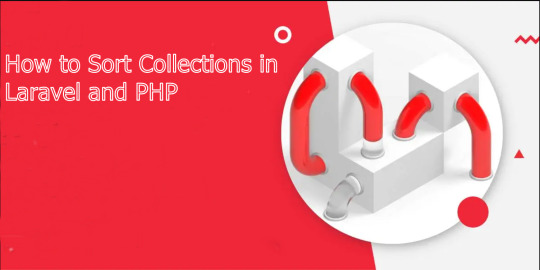
View On WordPress
#laravel 8#laravel collection sorting#laravel sorting#php#sort by custom collection#sort by orderId#sorting#sorting collection in laravel
1 note
·
View note